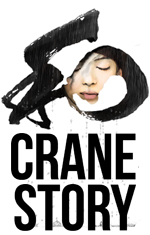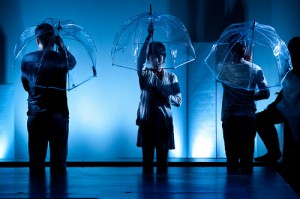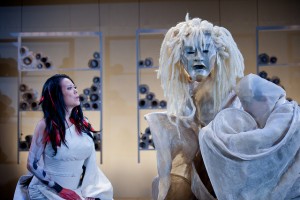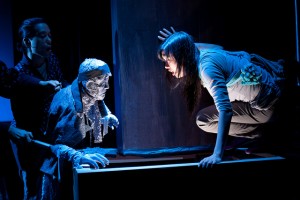ARCANE CRANE
Jen Silverman’s Crane Story borrows storytelling stage conventions from both east and west. A raised empty platform acts as the main acting area surrounded by wooden paneling. There are drums, puppets, small musical instruments, and an ensemble of seven performers who act as characters, puppeteers, musicians, and stage crew. Such eastern stage traditions first introduce the female character Crane (Christine Toy Johnson), a human-sized bird persona, draped with white plumage, grand gestures, birdcalls, and a very mysterious relationship with spirits. This part of the play comes off very esoteric and cold; it is an intriguing idea that may have worked better on paper than on stage.
The western part of the play is much more heartfelt and consists of contemporary scenes in which an impassioned Japanese-American young woman (Angela Lin) travels to Japan to discover the truth of her seventeen year old brother’s recent death. When the only answer she can find is that his death was an apparent suicide, she follows a spirit to the underworld where she is able to borrow her dead brother’s spirit – as if borrowing a book from a library. Not fully understanding the correct procedure and terminology, she ends up with her brother’s spirit at the age of thirteen. His innocent boyish charm leaves her clueless as to why he might end his life in four short years.
Meanwhile, back in Japan, a wandering amateur American musician (Barret O’Brien) has befriended a local underage Japanese girl, and their connection is intense, otherworldly, and unlike anything he’s ever experienced. But his revelation upon disrobing her is reminiscent of David Henry Hwang’s M. Butterly, while the Greek device of going underground brings to mind Sarah Ruhl’s Eurydice. While Silverman shows promise as a writer, her intellectually ambitious script lacks the maturity, wisdom, and storytelling skills which are necessary to draw us in. Despite the play’s four years of development, she is merely tapping into themes without fully exploring them.
The accomplished, versatile acting ensemble – Louis Ozawa Changchien, David Shih, Susan Hyon, and Jake Manabat – is directed with a confident hand by Katherine Kovner, who capably fuses eastern and western stage conventions, ably assisted by the proficient design team. When the performance incorporates the Bunraku-inspired puppets by Puppet Kitchen, there are creative moments of pure theatrical synergy.
Although Crane Story has yet to achieve its potential, those who enjoy complex parallel stories – where souls adrift connect and find love from loss – and watching an up-and-coming playwright sprout her wings toward greatness, this is an odyssey worth exploring.
photos by Erik Pearson
Crane Story
ends on October 1, 2011
for tickets, visit Playwrights Realm




